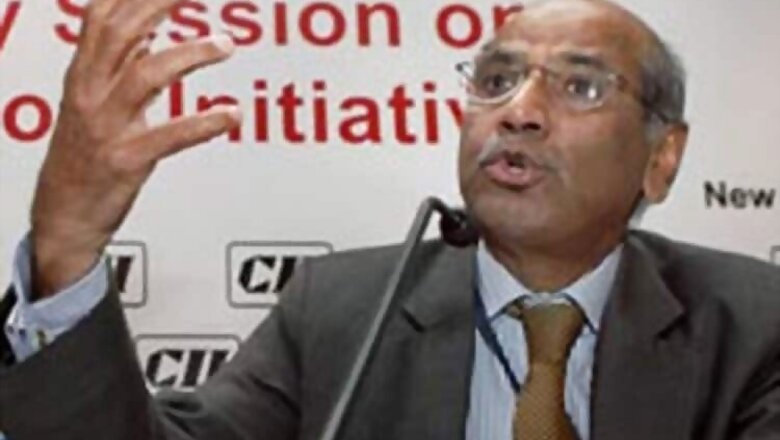
views
New Delhi: The resolution of the Doklam standoff has been satisfactory for India but a similar situation may not have a similar ending, says former Foreign Secretary Shyam Saran.
In a wide-ranging conversation with CNN-News18’s Anubha Bhonsle, Saran, whose book “How India Sees the World” was released on Thursday by the Former Prime Minister Manmohan Singh, said that India should be both prudent and firm in its ties with China.
“The lesson we should not draw is that we are capable of handling it,” he said, adding that the government should be relieved the standoff did not escalate further.
Here are excerpts from the conversation with Shyam Saran, who was also PM Manmohan Singh’s special envoy on Nuclear Affairs and Climate Change.
The Doklam Disengagement
Saran: My own opinion is that this was targeted at convincing Bhutan that it should move ahead with the border settlement between the two countries that has been in the works for quite some time. Bhutan has not agreed to the terms offered by China. China as you know has been interested in establishing diplomatic relations and trade with Bhutan.
My sense is that the issue of Doklam came off as a nudge to China to not go ahead on this. Maybe there was a collateral benefit in terms of China’s relation with India as well but I don’t think that was the primary target. And I think the very strong and vitriolic reaction was because of the surprise element as they did not expect this kind of confrontation with Indian forces on Bhutanese territory.
From the Indian point of view, it has been a satisfactory diffusion of the situation as we wanted a restoration of the status quo. Also, the timing of the BRICS summit made sure it was in China’s interest that there were no disagreements. The important outcome of Xiamen meeting is that we can be encouraged and hopeful.
What if Doklam-Like Situation Happened Again?
Anubha: Since the disengagement happened it has been assumed it was due to resolve and tough-minded diplomacy. And there is an underlying assumption that we can pull this off again if there is a standoff.
Saran: I do not think we should do that. We should be relieved as it could have escalated. We should try and make certain we should not get into a similar situation. We shouldn't assume that we can resolve it.
We should consider the fact that the context in which we handle relations with China has changed. When I used to negotiate on climate change, our ally was China. Ten years later, when you have the Paris agreement it is US and China that have their template.
We should handle this relation with a degree of prudence and firmness. This is something that needs constant attention. The lesson we should not draw is that we are capable of handling it. We should manage our infrastructure at the border well or we would not be able to handle it as well as we should.
The China Relationship
Anubha: What according to you are the irritants and annoyances and what should we pay attention to?
Saran: Take the example of NSG issue. Substantially, we got we wanted through the waiver. It would be important to have membership. If problems don’t arise out of China’s opposition, it should not become a critical issue in our relationship with them. The listing of terrorist group in UN is more China's problem as it is seen as them standing against fight on terror the world over.
I am very encouraged by the meeting and the statement. It is a complex relationship. There has always been elements of cooperation and confrontation. The challenge that lies now is how we raise the salience of those areas where we have common interest and how do we minimize the possibility of some contested issues becoming larger than life.
Diplomacy, Modi Style
Anubha: Is there a substantive difference in the way this government looks at Beijing vis-a-vis the previous regime?
Saran: Every government has its own style. Modi believes personal leader to leader relations play a very important role. Also, there is a more energetic pursuit and greater focus on economic issues. Much of India's foreign policy is how much continuity there is. The parameters haven't changed much but international issues keep evolving and you have to adjust to the change. The basic foreign policy has been consistent.
Break the Disruption-Dialogue-Disruption Pattern
Saran: Pakistan is a big challenge. We need to get out of the pattern of dialogue, disruption, dialogue, disruption. Whatever problems, engagement with Pakistan is important precisely for the reason that you have major issues.
We need to not only have pressure points to change these strategic calculus in Islamabad, but at the same time we should ensure that the assets we have in dealing with Pakistan like trade or dealing people to people relations are not affected. If Pakistani actors want to come, welcome them, if authors want to come, then why not. It should be a two track approach. They need resources in terms of attention to sustain the kind of engagement that we need. But Pakistan should not take the attention we need to give to all neighbours.
Can India Take the Lead on Climate Change
Saran: I think we have done well to say that we remain committed to the Paris agreement. I think we forget that India has a good story to tell in terms of global energy. The PM has put personal commitment in international solar reliance or technology network. They are important initiatives. India's energy intake is declining. It is important to note that. Even historically, we have always seen nature as nurture and not a dark force to be conquered.
India’s No First Use Policy
Saran: The nuclear doctrine has served us well and built up our nuclear capabilities. If you change the doctrine, the infrastructure of nuclear strategic programme will also have to shift. It is necessary and it has served us well to fix things.

















Comments
0 comment